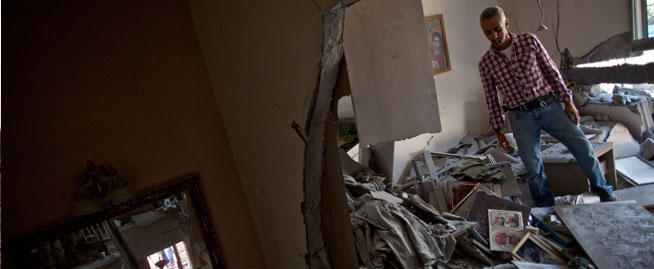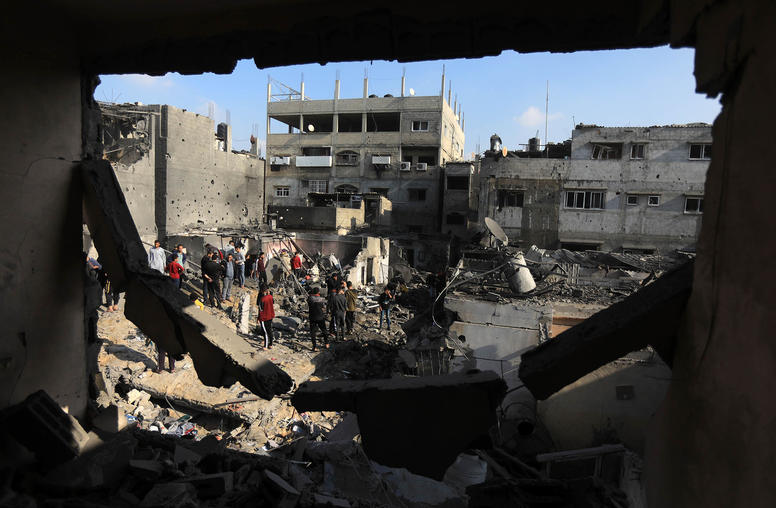
As the U.S. election ushered in a second term for President Obama, Middle East-watchers wondered about the pride of place the Israeli-Palestinian, and broader Arab-Israeli conflict might take in his foreign policy agenda. There emerged a common analysis that the President would have bigger things on his plate. In the same region, alone, there is the problem of Iran and its nuclear ambitions, the Syrian civil war which shows little sign of abating, the ongoing political transitions in North Africa -- all seemed relatively quiet on the Israeli-Palestinian front.
Cut to today. Since last Wednesday when an Israeli airstrike killed its target – the top military commander of Hamas, Ahmed al-Jabari – cross-border rocket fire has claimed the lives of over 90 Palestinians and 3 Israelis. The toll of injured is significantly higher. More than 540 rockets have landed inside Israel from Gaza, with over 300 more intercepted mid-air in the past six days. The Israeli military has launched over 1,000 strikes on Hamas military targets and announced that it is fully prepared to launch a ground operation into Gaza, if necessary. Quiet has been shattered.
There is no doubt an element of déjà vu for President Obama. Less than two months after his 2008 election, as President Bush was finishing out his term, Israel launched Operation Cast Lead. As explored in the new book from USIP’s Study Group on Arab-Israeli Peacemaking – “The Peace Puzzle: America's Quest for Arab-Israeli Peace, 1989–2011”, the devastation associated with that military operation led Obama to express a determination to resolve, once and for all, the seemingly intractable conflict between Israelis and Palestinians. As history has proven, this is no easy task and the conflict persists, but to view today’s Israel-Gaza hostilities as a pure re-run of four years ago is to not take into account what has changed since then: namely, the regional picture.
Former Egyptian President Mubarak has gone, and with the Muslim Brotherhood having won that country’s first popular election, Egypt’s new President Morsi represents a growing Islamist political voice in the region that would like to see a more aggressive stance taken towards Israel. Morsi has already come out strong in his rhetoric, has recalled Egypt’s ambassador from Israel, and dispatched Egypt’s prime minister to Gaza in what amounted to primarily a solidarity visit. But the apparent reluctance to move beyond rhetoric in his support for Hamas underscores the quandary in which Morsi finds himself. The economic crisis facing his country argues squarely against political and diplomatic moves that would jeopardize the Egyptian-Israeli peace treaty and, with it, Western support. In addition, Egypt’s own security concerns in the Sinai, where growing militant activity has targeted not only Israelis, but also Egyptian security forces, makes the Egyptian leadership reluctant to implement a full and unconditional opening of the border with Gaza, and to entertain the potential for more instability. At a time when Morsi is concerned with Egypt regaining its influence as a regional player, and one with strong international credibility, his best option lies with his country’s intelligence officials being able to successfully broker a ceasefire. Efforts in that regard are underway.
Syria is mired in a civil war with a ghastly and ever-climbing death toll. For the first time in decades, the Syria-Israel cold war showed dangerous hints of heating up when mortars from Syria landed over the border into the Golan Heights, prompting Israel to fire back. While these incidents are likely stray ramifications of a war that is inwardly-focused, the shattering of calm on a border that Israel had long come to rely upon as stable was likely an unwelcome reminder to Israelis that yet another hostile front could open up.
Iran is no doubt watching closely, having counted on Hamas as one of its avenues of defense against an attack that Israel has threatened against Iran’s nuclear capabilities. Israel has long known that Hamas has Iranian fajr rockets in its possession. Last Wednesday’s targeted assassination of al-Jabari, followed a year of more than 800 rocket attacks into Israel from Gaza, most coming from militant groups not directly under Hamas’s control. Israel is anxious to try to neutralize Hamas’ and other groups’ ability to use these longer-range weapons and has been directly targeting these caches and capabilities in their hits on Gaza. These weapons’ potential has been on display during this latest round of fighting when last week, for the first time since 1970, a rocket reached the Jerusalem area, and Tel Aviv has been a rocket target for the first time since the Gulf War of 1991.
Closer to home, there is concern that the relative quiet that has reigned in the West Bank for the past few years, under the leadership of President Mahmoud Abbas, could crack. Clashes have erupted between Israeli soldiers and Palestinians angry at the situation in Gaza. But the Palestinian leadership is also under pressure, as some of these protesters express anger at their perception of an Abbas government failure to take a stronger line in support of Hamas. With concerns that longstanding Palestinian public frustration at the ongoing split between Hamas and Fatah could reach a boiling point, the last couple of days have seen the Abbas government exercise greater tolerance of political activity by Hamas in the West Bank, and an announcement by Fatah and Hamas that they have ended their division in the face of the current fighting. It remains to be seen if this long-elusive reconciliation can hold weight beyond the current climate, but in the meantime, Abbas is facing a more immediate challenge. November 29th is looming: the date on which Abbas has pledged to pursue a bid at the U.N. General Assembly for Palestinian non-member observer status. Thus far, Abbas has shown no signs of reversing course on this move which would be in the face of intense U.S. and Israeli opposition. The ramifications for an already-ailing West Bank economy could be severe, given that the move is likely to trigger a cut off of Israeli and U.S. funds to the Palestinian Authority.
The fighting between Gaza and Israel may look familiar, but with a changing regional picture, the stakes are only getting higher for all stakeholders. One can hope that neither Hamas nor Israel is interested in the devastating repeat of Operation Cast Lead, and that the already-too-high costs and casualties will allow both sides to accede to a cease-fire before things get worse. But perhaps the key lesson from the déjà-vu is not to be lulled by the quiet in the context of the Israeli-Palestinian context: it doesn’t hold. In The Peace Puzzle, the authors examine the past efforts of U.S. administrations to resolve the Arab-Israeli conflict, drawing on lessons from the past to inform the future. Among their conclusions is that an American president and his team can bring hefty diplomatic influence to an Arab-Israeli peace process. As President Obama’s second inauguration approaches, and Israel and Hamas are once again at war, no doubt how best to bring such weight to bear, against the backdrop of a changing and fragile Middle East region, is foremost on his mind.
Comments:
| Date: Wednesday, November 21, 2012 1:25 PM From: Warren S. Wright |
|
As to the words of the song "When Will They Every Learn," when will the United States ever admit that any resemblance of peace and stability between Israel and the Palestinians will only take place when Israel stops treating the Palestinians as "Children of a lesser god." We are fools! |



